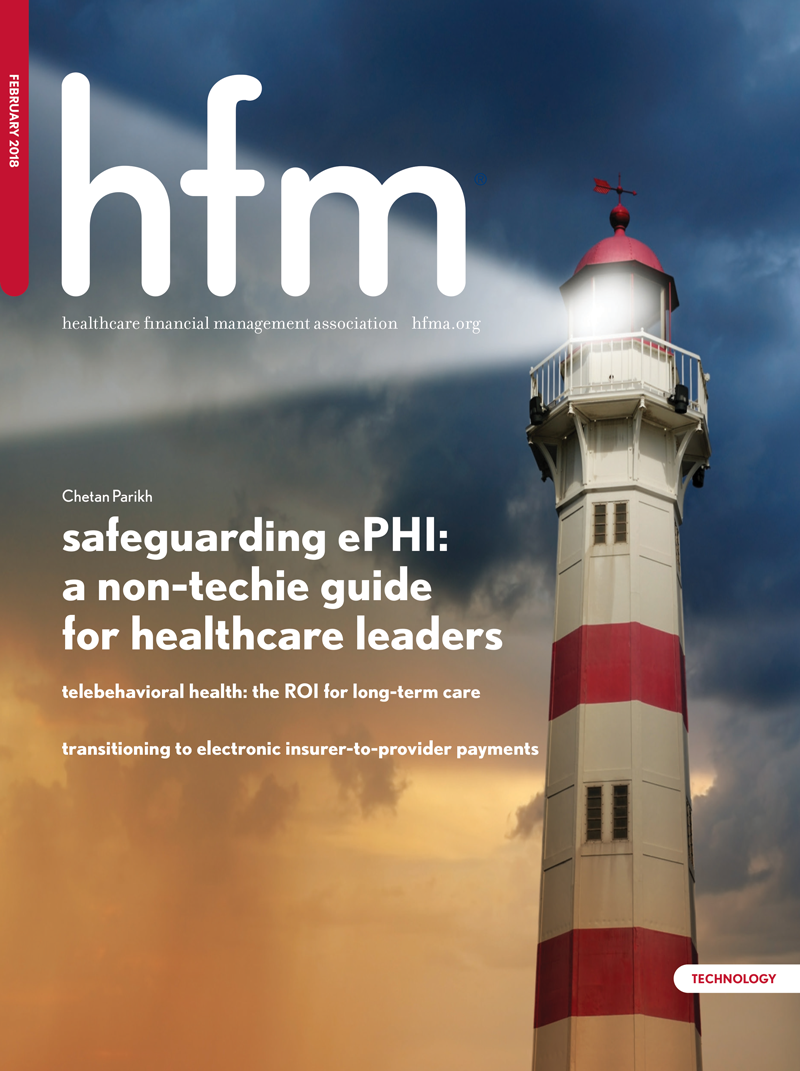
Cover Story
Safeguarding Electronic Protected Health Information: A Non-Techie Guide for Healthcare Leaders
Cybersecurity remains one of the biggest risks in health care yet is grossly underfunded by many healthcare organizations.
By Chetan Parikh
From the President’s Desk
|
Figure: exit rich text editor to add content | Expanding on thoughts in his February 2018 column in hfm, HFMA President and CEO Joseph J. Fifer, FHFMA, CPA, talks about variations in healthcare prices and implications for stakeholders. |
Video: GASB and FASB Updates
Brian Conner, partner for Moss Adams LLP, takes an in-depth look at GASB, FASB, and other accounting updates in health care.
Early Edition
From Disparate Data to Informed Strategies: Using Technology to Transform Quality, Costs, and the Patient Experience
A healthcare organization’s ability to sustain high-value care delivery and ensure its long-term financial viability is increasingly dependent on how effectively it can apply data analytics to inform improvement efforts.
By Jennie D. Dulac, RN and Walter W. Morrissey, MD
Mobile Health Strategies for Patients
A Midwestern health system is working toward its goal of providing high-quality care at a manageable cost with a web-based patient care platform.
By Kevin Palattao
On Point
A Look at the Trump Administration’s Approach to HIT
The Trump administration’s actions in 2017 to promote interoperability, and its stance in favor of promoting consumer-directed data exchange, suggest health information technology will remain a priority in 2018.
By Lia Winfield, PhD
Healthcare Matters
Observations About Value-Based Purchasing
As it is currently designed, the Value-Based Purchasing program established by the Centers for Medicare & Medicaid Services may not be effective in promoting improved quality of care.
By Paul Shoemaker
Features
Case Study
Telebehavioral Health: The ROI for Long-Term Care
To understand the financial impact of telebehavioral health services in long-term care facilities, a study compared the financial performance of facilities with telehealth services with that of facilities without such services.
By Louis Rossiter, PhD, William Austin, CPA, and Jonathon M. Gammon, MBA
Case Study
Overcoming Common Obstacles of Transitioning to Electronic Insurer-to-Provider Payments
A Pennsylvania health plan worked with providers to implement electronic payments and eliminate the issues of paper checks.
By Bob Hough
Case Study
Using Predictive Analytics to Align ED Staffing Resources With Patient Demand
A data analysis provided the basis for developing an emergency department staffing model that more precisely accounted for day-to-day variations in volume of patient visits.
By Jeffrey Skinner, MHA, BSN, CEN, Raymond J. Higbea, PhD, FACHE, Debra Buer, and Chelsea C. Horvath
Special Feature
Staying Ahead of the Consumerism Curve
HFMA’s first Healthcare Consumerism Symposium shed light on major trends that are disrupting the industry, and strategies that providers should be considering to keep up.
Focus Area
Cost and Quality
The (Non-Financial) Benefits of Reducing Unnecessary Lab Testing
Quality improvement projects that focus on more efficient management of resources may improve patient satisfaction and result in modest cost savings.
By Alden W. Hall, MD, MS, MPH
Columns
From the Chair
HFMA’s ‘Secret Sauce’
The ability to deliver value that meets the critical current and future needs of healthcare stakeholders, whether they be patients or healthcare finance professionals, requires at some point a step forward with faith.
By Carol A. Friesen, FHFMA, MPH
From the President
Price Variation 101
Price variation has been a hot topic in healthcare industry circles but most consumers are unaware that healthcare prices vary.
By Joseph J. Fifer, FHFMA, CPA
Eye On Washington
Solving the Opioid Crisis: A Critical Role for Medicaid
The Medicaid expansion has benefited states hardest hit by the opioid epidemic and has eased the burden of uncompensated care on hospitals and other healthcare providers.
By Ceci Connolly
Integration
Healthcare Microeconomics 401
When contemplating a consolidation today, healthcare leaders may need to consider new economic principles that account for consumer engagement and the impact of the consolidation on cost.
By Keith D. Moore, MCP and Dean C. Coddington
Healthcare Innovation
A Carrot or a Stick?
Incentives may not be enough to trigger a shift to voluntary alternative payment models.
By James H. Landman, JD, PhD
Capital Finance
The Increasing Importance of Strategic Capital Planning
Strategic capital planning can provide certainty amid a time of a large number of unknown external variables.
By Kelly Arduino
Departments
Data Trends
Median Indicators for 2017 Provide Snapshot of U.S. Hospitals’ Recent Operational Performance
Hospital data was collected for one year and grouped into five categories.
Supplements
HFMA Executive Roundtable
Pursuing a Data-Driven Revenue Cycle
By monitoring key performance indicators and employing data analytics, healthcare organizations can uncover critical revenue cycle performance opportunities. In this roundtable, several revenue cycle leaders discuss how they use data analytics and the benefits they’ve seen.
HFMA Executive Survey
Value-Based Payment Readiness
HFMA researchers surveyed 117 senior financial executives about their organization’s value-based payment readiness in September 2017. Among the findings, respondents said the roll-out of commercial value-based programs may be somewhat slower than expected.
Advertising
Trendsetter
Re-Envisioning Patient Identification
This article discusses how Imprivata is transforming the patient identification process, leveraging next-generation biometric solutions to ensure accuracy and improve efficiency.
Business Profile
Ensemble Health Partners: Driving Revenue Cycle Innovation
Judson Ivy, founder and CEO of Ensemble Health Partners, discusses the value of revenue cycle outsourcing and the importance of selecting the right partner.
Trendsetter
Addressing the Needs of Specialty Pharmacy Patients
Premier Inc. partners with health systems to improve how specialty pharmacy patients are managed across the continuum, enabling collaboration while driving improvement in cost and quality outcomes.
Business Profile
Change Healthcare: Accelerating Revenue Cycle Transformation
Jason Williams, vice president for strategy and business analytics, Change Healthcare, discusses the importance of technology and technology-enabled services in reinventing the revenue cycle.





